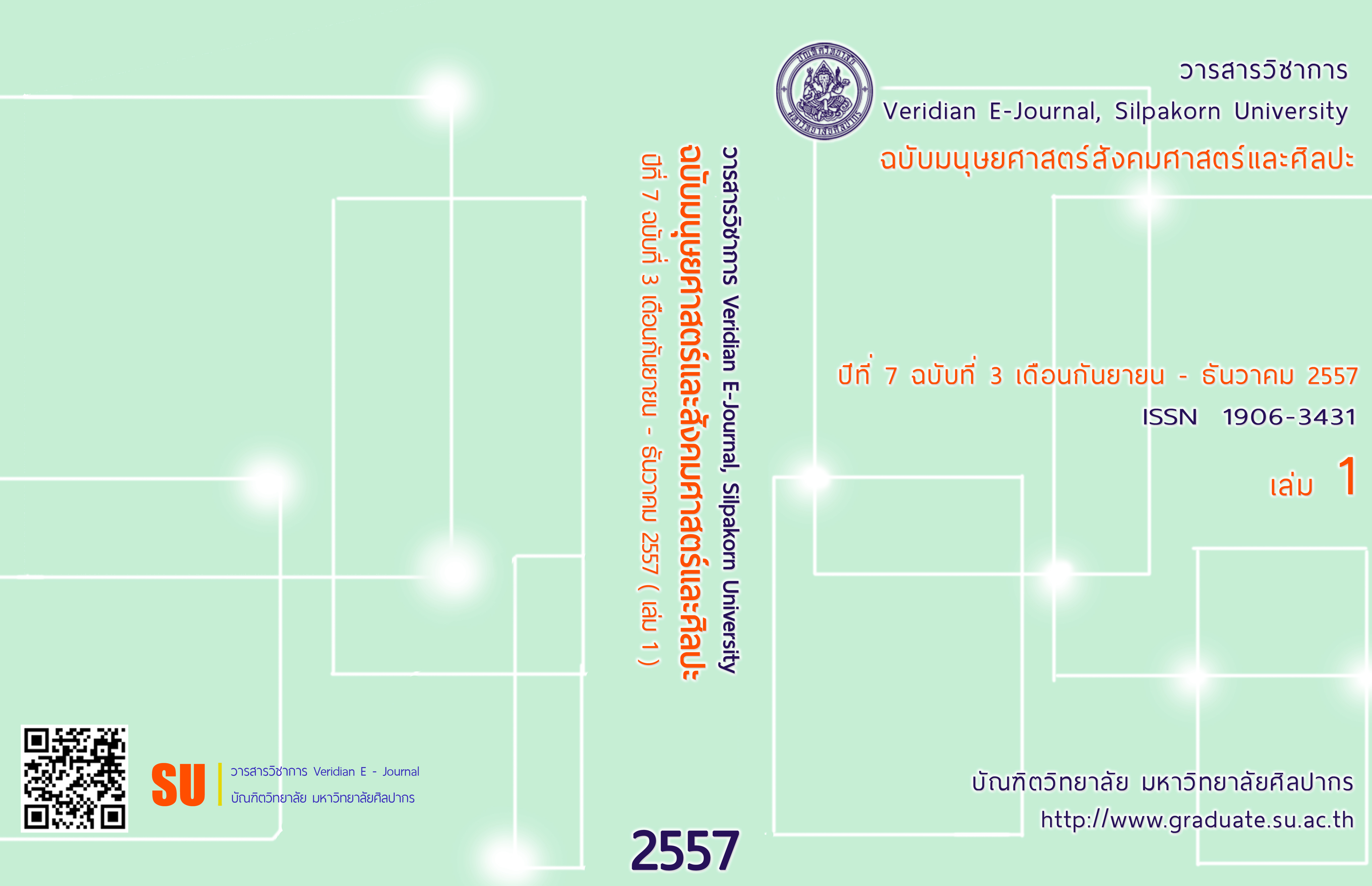การจัดการการท่องเที่ยวชุมชนอย่างยั่งยืน: กรณีศึกษา บ้านโคกไคร จังหวัดพังงา
Main Article Content
บทคัดย่อ
บทคัดย่อ
การศึกษาเรื่อง การจัดการการท่องเที่ยวชุมชนอย่างยั่งยืน กรณีศึกษา บ้านโคกไคร จังหวัดพังงา เป็นการศึกษาเชิงคุณภาพมีวัตถุประสงค์ในการศึกษาการจัดการการท่องเที่ยวชุมชนอย่างยั่งยืน และองค์ประกอบที่สำคัญต่อการจัดการการท่องเที่ยวชุมชนอย่างยั่งยืนของกลุ่มการท่องเที่ยวชุมชนบ้านโคกไคร จังหวัดพังงา โดยวิเคราะห์ตามแนวทางการจัดการการท่องเที่ยวอย่างยั่งยืนตามแนวทางของ Shaw and Williams (2004) ผู้วิจัยดำเนินการวิจัยด้วยการสัมภาษณ์เชิงลึกกับผู้นำกลุ่ม และใช้การสังเกตอย่างมีส่วนร่วมและการสังเกตอย่างไม่มีส่วนร่วมระหว่างการดำเนินกิจกรรมทางการท่องเที่ยวของกลุ่มการท่องเที่ยวชุมชนบ้านโคกไคร
ผลการวิจัยพบว่า กลุ่มการท่องเที่ยวชุมชนบ้านโคกไครดำเนินงานในรูปแบบวิสาหกิจชุมชนที่ให้บริการนำเที่ยวกับนักท่องเที่ยวทั้งชาวไทยและชาวต่างประเทศ โดยมีกิจกรรมการท่องเที่ยวที่โดดเด่น ได้แก่ สปาโคลนร้อนและทรายร้อน การชมปูมดแดง การเก็บหอยตลับ การพายเรือคายัค ทั้งนี้ กลุ่มการท่องเที่ยวชุมชนบ้านโคกไครได้เข้าร่วมเป็นเครือข่ายการท่องเที่ยวชุมชนจังหวัดพังงา มุ่งเน้นการส่งเสริมและขับเคลื่อนการเติบโตอย่างยั่งยืนของชุมชนที่ดำเนินกิจกรรมทางการท่องเที่ยว โดยกลุ่มการท่องเที่ยวชุมชนบ้านโคกไครมีศักยภาพทางการจัดการใน 4 ด้าน ได้แก่ ศักยภาพทางด้านทรัพยากรการท่องเที่ยว ศักยภาพทางด้านการบริการและการให้ประสบการณ์ที่มีคุณภาพแก่นักท่องเที่ยว ศักยภาพทางด้านการบริหารจัดการการท่องเที่ยว และศักยภาพทางด้านการมีส่วนร่วมของชุมชน
องค์ประกอบหลักของการท่องเที่ยวชุมชนอย่างยั่งยืนของกลุ่มการท่องเที่ยวชุมชนบ้านโคกไครคือ ศักยภาพทางการท่องเที่ยว กระบวนความคิดแบบยั่งยืนในด้านการมีจิตสำนึกที่ดีในการให้ความสำคัญกับการอนุรักษ์ทรัพยากรธรรมชาติและความยั่งยืนของทรัพยากรทางการท่องเที่ยวมากกว่าการมุ่งเน้นที่ผลประโยชน์ด้านรายได้ มุ่งที่จะใช้การท่องเที่ยวเป็นเครื่องมือในการอนุรักษ์ทรัพยากรทางธรรมชาติและสิ่งแวดล้อม ตลอดจนการรักษาทุนทางวัฒนธรรมของชุมชน รวมทั้งตัวผู้นำชุมชนที่มีการเปิดโอกาสให้สมาชิกในชุมชนได้มีโอกาสมีส่วนร่วมกับการดำเนินกิจกรรมการท่องเที่ยวทั้งทางตรงและทางอ้อม ซึ่งเป็นส่วนสำคัญที่ทำให้กลุ่มการท่องเที่ยวชุมชนได้รับการสนับสนุนจากสมาชิกในชุมชนส่วนใหญ่
Abstract
This study of sustainable community-based tourism: the case of Ban Kokekrai, Phang Nga Province is the qualitative research by aiming to explore the management of sustainable community-based tourism and the crucial components of sustainable tourism: the case of Ban Kokekrai, Phang Nga Province. By analyzing through Shaw and Williams’s (2004) the guidelines of sustainable tourism, researcher conducted in-depth interviews with the leader of community-based tourism group, and also participant and non-participant observations during tourism activities of Ban Kokekrai community-based tourism group.
The results showed that Ban Kokekrai community-based tourism group is the local community enterprise by providing travelling service for Thai and international tourists. The unique tourism activities of Ban Kokekrai are hot mud and sand spa, watching crab (Phricotelphusa Limula), picking Enamel Venus shell, kayaking and etc. The Ban Kokekrai community-based tourism group has joined a network of community-based tourism in Phang Nga, focused on promoting and driving the sustainable growth of the tourism community activities. Ban Kokekrai community-based tourism group has management potentials in 4 aspects: tourism resource, service and tourism experience, tourism management, and community members’ participation.
The key elements of sustainable community-based tourism were the tourism potential, and the co-creation of mindset toward the preservation of tourism resources and its sustainability, rather than focus on revenue only. Ban Kokekrai community-based tourism group employs tourism as a tool for conservation of natural resources and the environment, as well as the cultural capital of the community. Ban Kokekrai community-based tourism group provides opportunities for community members to participate directly and indirectly. This is the crucial part for getting supports from other members of community.

